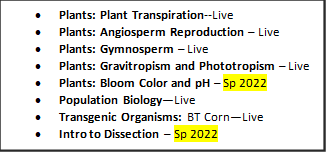3 Practical Ways to Incorporate Relevancy in Non-Majors Bio
Relevancy is key to getting your students to engage with course content.

There’s no shortage of teaching challenges for the non-majors bio course, but incorporating relevancy definitely ranks among the highest. Relevancy is the key to getting your students to engage with the course content, with each other, and with you. It is necessary for getting your students past memorization and into application. But talking about the importance of relevancy and making the material relevant to students are two different things.
First, let’s consider what relevancy means to a student. Research shows that students are most interested in how a subject impacts their own life, goals, and success. Take time at the beginning of your course, and throughout the semester, to highlight the content's relevancy in terms of their academic, career, and life goals.
Next, make the content relatable to their world. And while you cannot control a student’s passion for a biology course, you can use examples that will generate engaging discussion and even heated debate. Participation in-class activities, group discussions, and application exercises will soar if you choose topics that students are experiencing in the world around them.
Instructor and author, Michael Windelspecht, keeps relevancy alive in his class by utilizing a few simple techniques:
- Use what’s popular
Michael wrote an article relating to the popular Netflix series Making a Murderer to teach the topic of evolution. Chances are high that your students have seen the show and can relate their knowledge to this article. Included with the article are discussion questions that your students can complete outside of class to enhance application of concepts or in-class to enrich discussions. Read More - Use what’s real
Dr. Windelspecht explains how BRCA1 genes can sometimes mutate and more likely to develop into cancer in this TED-ed video The 3-minute video, The Cancer Gene we all Have, can be utilized when discussing cell division and cancer.
The apple that doesn’t brown. Dr. Windelspecht collaborated with a student majoring in biology to write an article on the highly debated subject of genetically modified and transgenic organisms. GMOs are a hot topic and your students have no doubt heard about them and may even have serious concerns about them. This article provides discussion questions to use in class also! Read More - Let students pick
Let your students provide examples that are relevant to their life and interests. Having student provide their own examples not only alleviates the instructor's burden of picking which topics students will find relevant, but also provides an opportunity for your students to better understand the application of the materials they are learning. It’s a win-win situation!
If you find yourself struggling to find relevant examples, utilize topics that are trending on the news, social media and pop-culture. And don’t forget perhaps the best resource of all, your students!
For teaching tips that are specific to your course challenges, check out our Course Challenges Quiz.

